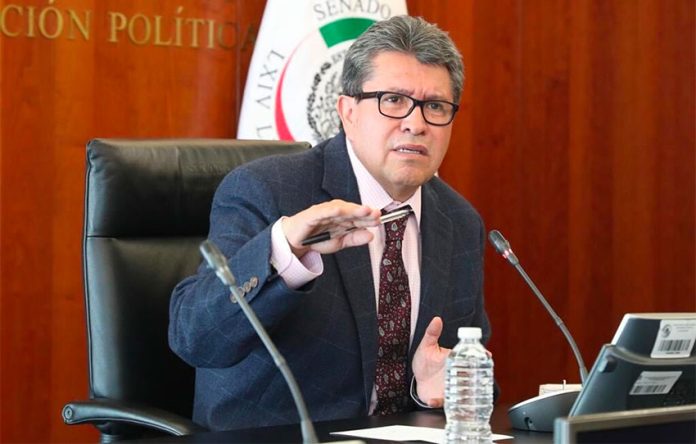The ruling Morena party has announced a plan to regulate social media platforms, raising a warning by an industry group that it would violate the new North American free trade agreement.
Drawn up by Morena’s leader in the upper house of Congress, a proposed amendment to the federal telecommunications law would require social media sites with more than 1 million users, including Facebook, Twitter, Instagram and YouTube, to request authorization from the Federal Telecommunications Institute (IFT), the telecoms regulator, in order to continue operating in Mexico.
Senator Ricardo Monreal’s draft law also stipulates that social media companies could face fines of up to US $4.4 million if they violate users’ right to free speech.
Anyone whose social media account is blocked, suspended or canceled would have the right to appeal the decision, according to Monreal’s bill. The Associated Press (AP) reported that the appeals would first have to be made to the companies’ internal committees and they would have a period of 24 hours in which to confirm or overturn the account suspension.
If they are not happy with the decision they receive, users could file an appeal with the IFT and if they’re not satisfied with its ruling either, they can find further recourse in the court system.
Monreal is planning to submit the proposal to Congress in the coming weeks, AP said. It appears to be at least partially motivated by the decision of Facebook and Twitter to suspend former United States president Donald Trump’s accounts in light of the attack on the U.S. Capitol building on January 6. President López Obrador criticized the companies for censoring his former counterpart, and even proposed creating a national social media network to avoid the possibility of Mexicans being censored. In addition, he said he would take the social media censorship issue to the next meeting of the G20.
“One of the things that affects freedom of expression occurs through impeding the right to receive information, by blocking content, as has happened in recent cases with Twitter,” says the draft law Monreal published on his website.
AP said the proposed law could violate the United States-Mexico-Canada Agreement (USMCA), which says “no party shall impose liability on a supplier or user of an interactive computer service on account of … any action voluntarily taken in good faith by the supplier or user to restrict access to or availability of material that is accessible or available through its supply or use of the interactive computer services and that the supplier or user considers to be harmful or objectionable.”
But Monreal says that clause of the three-way pact, which took effect last July, won’t apply to Mexico until the second half of 2023, suggesting that an amendment to the telecommunications law could remain in effect for 2 1/2 half years if it is passed soon by the Congress, in which Morena leads a coalition with a majority in both houses.
The draft law recognizes that social media sites have their own rules governing use and community behavior but says “it is necessary that these [internal] procedures be regulated by law, so that based on [a] decision [to suspend an account], an administrative or legal appeal can be made, in order to enforce users’ human right to justice.”
It also says that social media companies cannot use algorithms to resolve disputes over account suspensions, instead obligating committees of human employees to evaluate contested decisions.
The Latin American Internet Association (ALAI), which counts Facebook and Twitter among its members, said in a statement shared with the news agency Reuters that Morena’s proposed amendment would violate the USMCA.
The requirement for social media companies to request IFT authorization to continue operating would create “unjustified trade barriers that are not required in the U.S. or Canada, generating legal uncertainty and limiting the cross-border flow of data,” the group said.
ALAI told Reuters that it had expressed its concerns to Monreal, but in his proposed bill the senator said the amendment wouldn’t breach USMCA because its intention is to regulate the actions of social media platforms “with regard to content related to freedom of expression, which does not mean invading the sphere of free trade.”
In a video message published on Monday, the lawmaker said that social media companies have become powerful entities and that nation states shouldn’t allow themselves to be sidelined by them.
“The time has come” to regulate social media, Monreal said, pointing out that states have a responsibility to protect people’s human rights – such as the right to free speech – and asserting that social media companies should have the same obligation.
He said that he won’t present his proposed law in Congress until he has received feedback on it and for that reason posted it to his personal website. “I believe that the time has come not to run away from this debate,” Monreal said.
The senator, a former governor of Zacatecas who is also at the forefront of the efforts to legalize recreational marijuana, has previously floated the idea of raising taxes for highly profitable social media companies.
Monreal is an avid social media user with more than 3 million followers across Facebook and Twitter. The president, who has breakfast with the Senate leader on a semi-regular basis, is also a fan of the unfiltered access social media gives him to his supporters.
He has described social media networks as “blessed” or “holy” and was clearly irked when Trump, with whom he maintained an unlikely friendship, was kicked off Facebook and Twitter.
Social media companies have turned into “global institutions of censorship” and are carrying out a “holy inquisition,” López Obrador said in January.
“Since they took these decisions [to suspend Trump], the Statue of Liberty has been turning green with anger because it doesn’t want to become an empty symbol,” he quipped. “Freedom in the case of the United States is the First Amendment in their constitution.”
Source: AP (en), Expansión Política (sp), Reuters (en)
